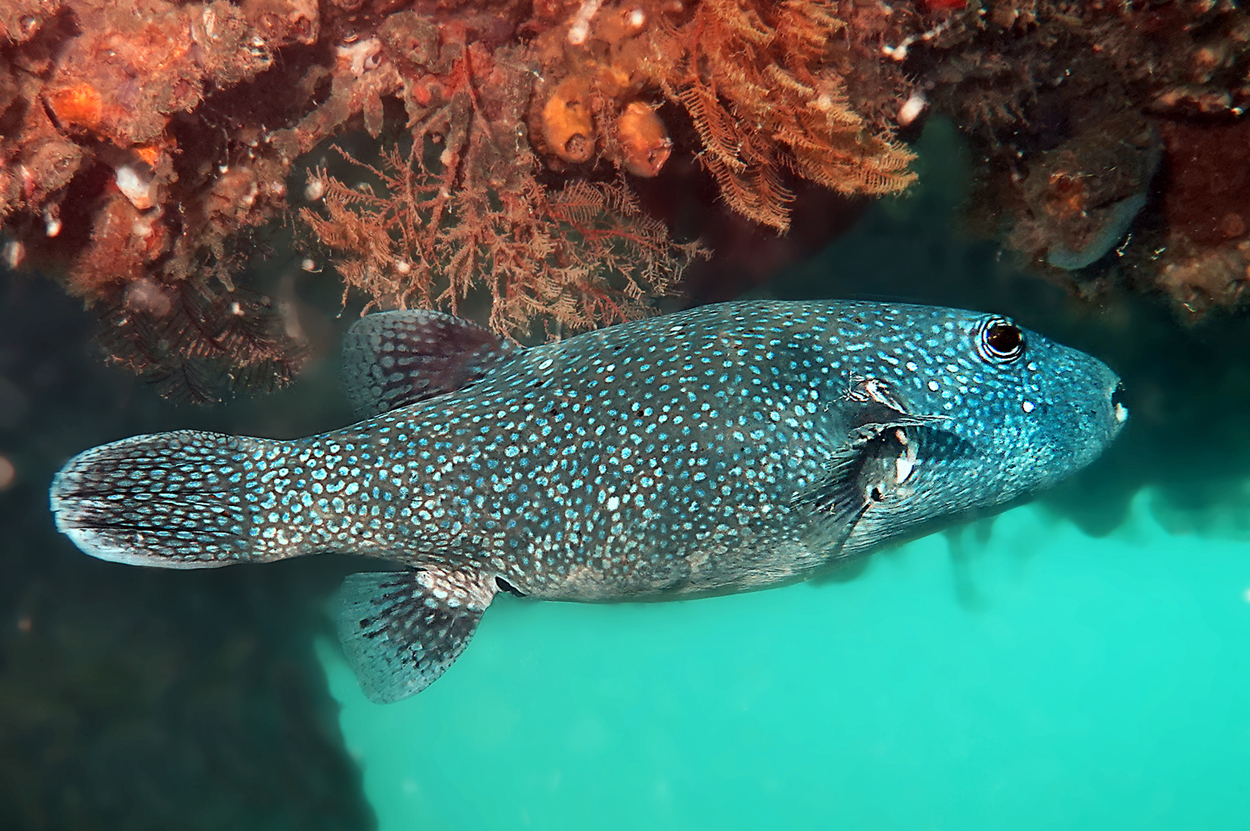- Classification
- ACTINOPTERYGII
- TETRAODONTIFORMES
- TETRAODONTIDAE
- Arothron
- caeruleopunctatus
Bluespotted Puffer, Arothron caeruleopunctatus Matsuura 1994
Other Names: Blue-spotted Puffer

A Bluespotted Puffer, Arothron caeruleopunctatus, at Navy Pier, Exmouth Gulf, Western Australia, November 2019. Source: Alex Hoschke / iNaturalist.org. License: CC by Attribution-NonCommercial
Summary:
A large bluish-grey to yellowish or brownish puffer covered with many small dark-edged pale blue spots on the body and fins, and alternating brown and blue lines around the eyes. The lower parts of the head and body may have black blotches.
Cite this page as:
Bray, D.J. 2022, Arothron caeruleopunctatus in Fishes of Australia, accessed 30 Jun 2025, https://fishesofaustralia.net.au/Home/species/1287
Bluespotted Puffer, Arothron caeruleopunctatus Matsuura 1994
More Info
|
Distribution |
Exmouth to NW of Karatha, Western Australia, and reefs in the Coral Sea to off Moreton Bay, Queensland; also Cocos (Keeling) Islands and Christmas Island in the eastern Indian Ocean. Elsewhere the species is widespread in the Indo-west Pacific: Réunion Island and the Maldives, east through Indonesia and Papua New Guinea, the Marshall Islands, New Caledonia, and north to southern Japan. Inhabits outer slopes on coral and rocky reefs at depths to 30 m. |
|
Features |
Dorsal fin 11–12; Anal fin 10–12; Pectoral fin 18–19. |
|
Size |
80 cm TL |
|
Feeding |
Presumably an omnivore feeding on benthic invertebrates. |
|
Similar Species |
The Stars-and-stripes Puffer, Arothron hispidus, has a dark patch around the pectoral-fin base, the Whitespotted Pufferfish, A. meleagris, has a dark underside (vs. a pale underside in A. caeruleopunctatus), and the Starry Puffer, A. stellatus, is covered in black spots (vs pale spots in A. caeruleopunctatus). |
|
Etymology |
The specific name caeruleopunctatus is from the Latin caeruleus (= blue) and punctatus (= spotted) in reference to the numerous blue spots on the head and body. |
|
Species Citation |
Arothron caeruleopunctatus Matsuura, K. 1994, Japan. J. Ichthyol. 4(1): 29, figs 1- 2. Type locality: Lagoon side of Bikini Island, Bikini Atoll, Marshall Islands, western Pacific, depth 2 m. |
|
Author |
Bray, D.J. 2022 |
|
Resources |
Bluespotted Puffer, Arothron caeruleopunctatus Matsuura 1994
References
Allen, G.R. 1997. Marine Fishes of Tropical Australia and South-east Asia. Perth : Western Australian Museum 292 pp. 106 pls.
Allen, G.R. & Erdmann, M.V. 2012. Reef fishes of the East Indies. Perth : Tropical Reef Research 3 vols, 1260 pp.
Johnson, J.W. 2010. Fishes of the Moreton Bay Marine Park and adjacent continental shelf waters, Queensland, Australia. pp. 299-353 in Davie, P.J.F. & Phillips, J.A. Proceedings of the Thirteenth International Marine Biological Workshop, The Marine Fauna and Flora of Moreton Bay. Memoirs of the Queensland Museum 54(3)
Hobbs, J-P.A., Newman, S .J., Mitsopoulos, G.E.A., Travers, M.J., Skepper, C.L., Gilligan, J.J., Allen, G.R., Choat, H.J. & Ayling, A.M. 2014. Fishes of the Cocos (Keeling) Islands: new records, community composition and biogeographic significance. Raffles Bulletin of Zoology Supplement 30: 203–219
Matsuura, K. 1994. Arothron caeruleopunctatus, a new puffer from the Indo-western Pacific. Japanese Journal of Ichthyology 4(1): 29-33 figs 1-2 https://doi.org/10.1007/s10228-016-0517-8
Randall, J.E., 2005. Reef and shore fishes of the South Pacific. New Caledonia to Tahiti and the Pitcairn Islands. University of Hawaii Press, Honolulu, Hawaii. 720 pp.
Randall, J.E., Allen, G.R. & Steene, R. 1997. Fishes of the Great Barrier Reef and Coral Sea. Bathurst : Crawford House Press 557 pp. figs.
Shao, K., Liu, M., Jing, L., Hardy, G., Leis, J.L. & Matsuura, K. 2014. Arothron caeruleopunctatus. The IUCN Red List of Threatened Species 2014: e.T193599A2245520. http://dx.doi.org/10.2305/IUCN.UK.2014-3.RLTS.T193599A2245520.en. Downloaded on 24 October 2017.








